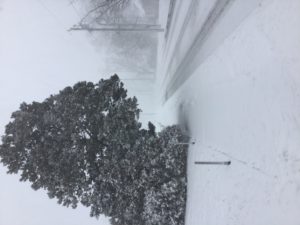I pulled Robert Nathan’s A Winter Tide off the shelf this morning; Nathan wrote these poems in the 1930’s, and they reflect his growing concern with Nazism and war. Some are hopeful, some not so much. Like most of us, Nathan surely had hope-filled days and days when hope was absent. Either way, I love his words.
Looking through the poems today, after finishing The Book of Joy just yesterday, I see something else in Nathan’s poems: an expression of re-framing, of accepting the darkness of life in the 1930’s and trying to draw from it whatever gifts it offers. Not such a bad thing to do. I hope a life of joy came out of it for Nathan.
III
It would be wiser, since we live in fear,
To use our sorrows to correct our ways.
If winter be the color of our days,
Then learn of winter to be still and clear.
The greener spring, the new and happy year
Is not for us but for the birds to praise;
It is the snow that over autumn lays
Its quiet hand that is our teacher here.
For see, it has its lessons for the soul:
Look how the tree with piety keeps fast
The bud and blossom hidden in the bole.
So bear the winter with its frosty blast,
And seek, beneath the season of our grief,
The spring unending and the waiting leaf.
[Nathan, Robert; A Winter Tide, III, New York: Alfred A. Knopf, 1940, p. 5]
photo by Jared Fredrickson


And my can’t winter be lovely–clear, as he says , clean–life stripped down to the bear necessities, no leaves to obstruct one’s view, crisp, scintillating, invigorating. Joy can be found in every season externally as well as within. Lovely. Thanks, Johnna–didn’t know Nathan.
He was a favorite of my high school mentor, so I was introduced early in life. I loved the words then, but their meaning changed as I aged. Peace, Johnna